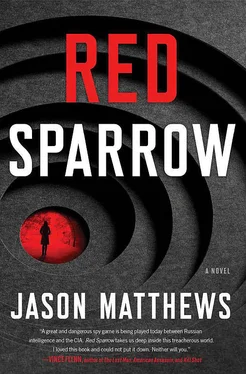“I personally believe that the traitor is in the Service,” said Egorov, while Zyuganov looked evenly at the image of Nash on the screen. Were they playing with him? Korchnoi thought. Zyuganov easily could be this diabolical.
“It is an assumption you’re making about the Service,” prattled Zyuganov. “One thing is sure. The Americans would not run the extraordinary risk of meetings in Moscow to handle a low-level source.”
Say something, be casual. “If you’re both right, brothers,” said Korchnoi, “and he’s a big fish and he’s in the Service, then the short list of candidates would be the Director, you, Vanya, and the twelve department heads, including Lyosha and me.” Korchnoi saw their sour looks. What was he doing? This was exhilarating madness.
“That, of course, is not considering that it could additionally be your special assistant, or a secretary, or a communications-code clerk, or a hundred other employees with indirect access to cable reading boards, their bosses’ in-boxes, and to unguarded conversations in anterooms and the cafeteria. Clerks in Records see more sensitive paper in a day than the three of us combined see in a week.” Korchnoi could tell from Zyuganov’s expression that he had already calculated all that. All the more people to interrogate.
Korchnoi decided to stop there. Too much analysis, too many pat phrases. Egorov ground out his cigarette. “You are exactly correct, Volodya. There are too many possibilities. We’ll catch this svoloch only if we get a creditable internal lead, or if we catch him or his handler on the street. These two options could take months, even years. That’s why our third option is the only one.”
“ Ogovoreno, agreed; your niece is our best chance,” said Korchnoi. This scene was unthinkable, improbable, impossible. He suppressed insane, cackling laughter. He was discussing finding the spy, flushing him out, exposing him, catching him.
Zyuganov swiveled in his chair, his feet not touching the carpet. “And if your niece does not succeed in a reasonable amount of time? Perhaps we then consider other means.”
Egorov turned to him quickly. “Absolutely not. I have received instructions from the highest levels. No ‘active measures’ in this operation. Is that clear?” Zyuganov swiveled a little more, a faint smile on his face.
“You’re right,” said Korchnoi. “In the history of our Service, in the history of postwar intelligence operations, no service has ever intentionally harmed an officer of an opposing service. It is not done. It would create havoc.” Zyuganov swiveled.
“Volodya, relax. If we wanted to try the rough stuff, I’d be talking to Line F, not you,” said Egorov, laughing. Korchnoi saw Zyuganov’s right eyelid twitch. “No, what I want is an elegant operation, nuanced, brilliant, that will produce quick results and will leave the Main Enemy wondering what hit them, wondering how they lost their sensitive asset and marveling at the SVR’s skill and cunning.”
MARBLE’S SIRNIKI PANCAKES
Thoroughly blend soft goat cheese, eggs, sugar, salt, and flour into a sticky dough. Refrigerate. Drop small balls of the dough into flour, coat well, and flatten into thin discs. Fry in melted butter over medium heat until golden. Serve with sour cream, caviar, smoked fish, or jam.
Korchnoi and Dominikawere standing in the tiny living room of the general’s apartment. The old man contemplated her unsettling beauty, and noted how smoothly she moved, how she walked with her back straight, how her eyes locked on his. The more time he spent with her, the more he was convinced that he had chosen correctly. Now he had to enlist her. Tonight would be tricky.
Outwardly she was unemotional, controlled, focused. But in her interactions, her gestures, even in her deference to him, Korchnoi saw her anger and determination. She had never spoken about Sparrow School, but Korchnoi had quietly found out most of the facts, just as he had done regarding her interrogation in Lefortovo.
She was hiding something, he knew. She daily declared herself eager to engage again with the American. But the timbre of her voice, the tilt of her head, made Korchnoi suspect that Dominika’s contact with Nathaniel in Helsinki had created conflicts, sympathies, perhaps feelings for him. He would soon find out.
They had started work on the “Nash Project,” as he called it. In his darkened office with the shades drawn, the general had clicked a remote, and images of Nate were projected on the white wall of the office. Out of the corner of his eye, Korchnoi saw Dominika draw in a breath. From the side, he could see her nostril flare. He went on remorselessly, minutely describing what the SVR knew about Nash, reviewing her own reports from Helsinki, watching her, weighing her inner reserves.
He had turned off the projector and looked at her sternly. This was more complicated than the previous mission in Helsinki, he told her. Dominika must travel outside Russia, and in order to make her foreign trips plausible, she would be reassigned to the SVR Courier Service in Directorate OT. She had to operate alone, in the West. She had to get close to and seduce the young American, identify the krysa, the rat. Could she still do that? Her dark eyes flashed, wavered. Emotion. Conflict.
It was a serious challenge for Dominika to look at Nate’s image on the screen. Had the general sensed her agitation? How long could she continue to fool him? Could he tell?
That evening, Korchnoi invited Dominika to his apartment. He would prepare a simple supper, a decidedly un-Russian pasta dish in celebration of their upcoming Rome trip, and they would continue discussing the operation. There was no hint of anything improper. General Korchnoi was a distinguished senior officer, a veteran spy, not a grubyj chelovek, a cad. They rode the Metro, got off at Strogino in the Fourth District, and walked along a broad leafy park beside the Moskva River. Korchnoi’s apartment building was the third in a line of five identical buildings, tubular high-rises in a row, streaked like candy canes from the rusting window frames. His apartment was on the twelfth floor—the dingy elevator groaned loudly as it carried them up.
The small apartment was spare but clean and comfortable, the living space of a person who lived alone, but who didn’t mind. There were a few treasures. An exquisite little framed Italian oil on the wall, a silk Persian carpet on the floor; these hinted at a career of foreign travel. In the corner were a well-worn easy chair, a reading lamp, and a low bookcase with a few bound volumes. The small room had a sweeping view of the oxbow curve of the river.
Dominika saw a framed picture of a woman and a very young-looking Korchnoi standing in front of a lake. It was summer and his arm was around her waist. “That was in 1973,” said Korchnoi. “One of the Italian lakes, Maggiore, I think.”
“Is this your wife?” asked Dominika. “She’s very beautiful.”
“Twenty-six years of marriage,” he said, taking the frame from Dominika and tilting it toward the fading daylight to look at it. “We traveled together around the world. Italy, Malaysia, Morocco, New York.” He put the frame back down on the table. “Then she became ill. Misdiagnosed for months.” They walked into the tiny kitchen. “Don’t get sick at a Russian Embassy overseas.” He smiled. Dominika noticed his head was bowed.
The general said he had moved into this apartment after his wife’s death, he couldn’t go back to their original apartment. He had traded it for this smaller one, relatively modern, relatively quiet, not too far out of town; he could enjoy the swath of green along the river. He didn’t tell Dominika that burst transmissions aimed out the twelfth-story living room window had exceptionally fine line-of-sight to the American satellite.
Читать дальше












